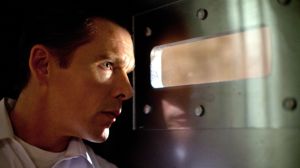There's something rather brilliant about the set-up for The Purge. One night a year, all crime is made legal throughout a reconstituted United States and citizens are encouraged to "purge" their inner demons. Basically, it's a feature film treatment of George Orwell's "Two Minutes Hate" from 1984. Security footage in your opening sequence introduces us to the concept, depicting acts of grainy savagery with convincing realism. Seeing these violent outbursts from across the country effectively ignites our imaginations about all the narrative possibilities that exist - that is, until the movie turns into a pretty standard home invasion thriller.
See, despite the intriguing premise you helped establish, _The Purge _focuses exclusively on home security salesman James Sandin (Ethan Hawke). We first see him cruising around his well-to-do suburb, making sure his clients are ready for the big night. His own middle-class mansion is also fully equipped for lock-down, hoping the mechanical steel shutters will protect his wife Mary (Lena Heady), wayward daughter Zoey (Adelaide Kane) and gadget-loving son Charlie (Max Burkholder). But when bleeding heart Charlie let's a wounded vagrant in off the streets for protection, the family becomes the target of a group of "hunters" who, on principle, refuse to allow this act of sanctuary go unpunished. The result is some good moral philosophizing within the family under intense pressure, and a bold mid-point decision that dictates how the rest of the story will unfold.
This first half of the movie worked me over perfectly. I knew the film was a low-budget production (about $5 million, from the savvy producers_ of Paranormal Activity_) and I could respect the decision to insulate the action. I assume, as well, that an infinitely scalable "Purge" series is also coming, rotating stories within this dystopian world and maybe eventually dealing with the political puppet masters. However, in this first incarnation, we're stuck with a group of characters that too often make ridiculous decisions in the service of formulaic scriptwriting - be it arbitrarily separating the family for added tension or delaying inevitabilities to set-up "surprises" (which most people will see coming a mile away).
And yet, The Purge finds a way to work overall. Early on, it does a good job suggesting that the low national crime rate is more a bi-product of an annual genocide that "purges" society of the lower classes than it is the result of successfully regulating violence. This adds a welcomed layer to the conflict, even if the story's murderers are psychotic slow-walkers in that typical movie villain way. The whole time, I couldn't help thinking about your titles sequence, and the clumsy, awkward, and desperate violence in the streets.
Hopefully I'll see you again in the next purge. For the right reasons.
Sincerely,

Christopher






